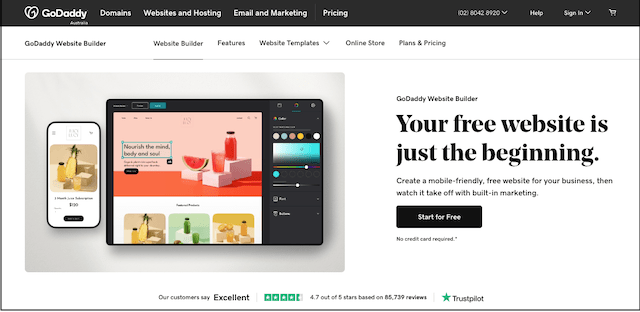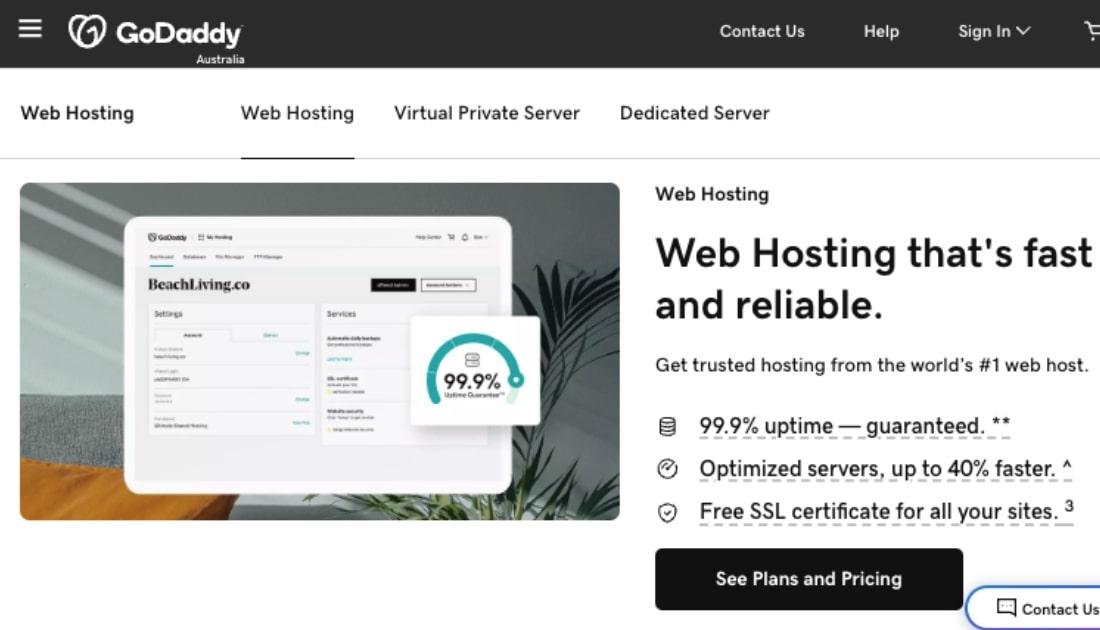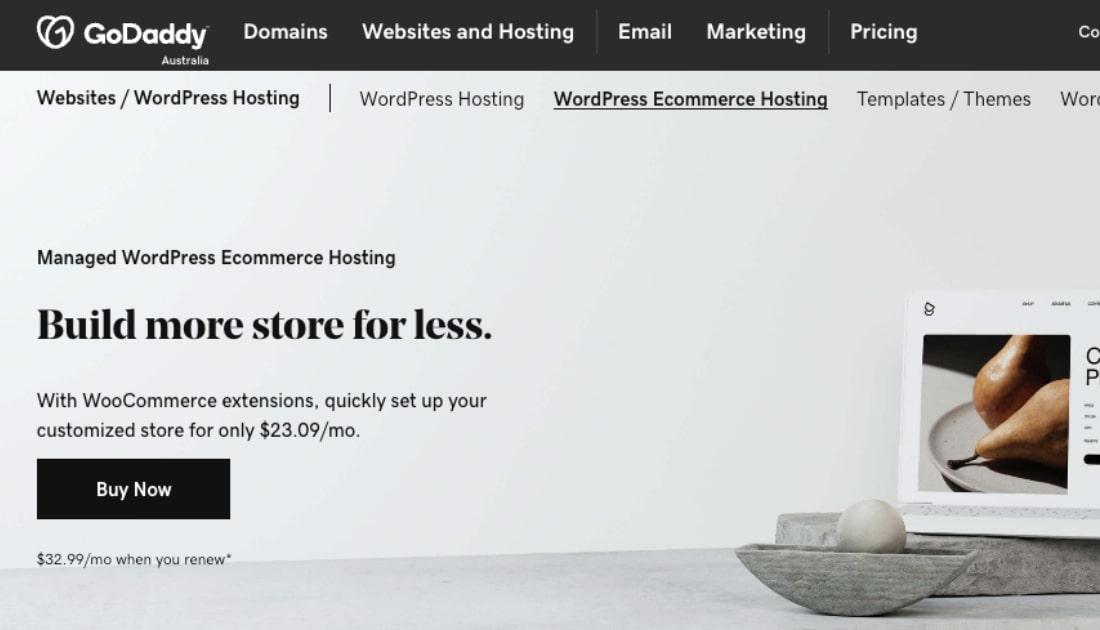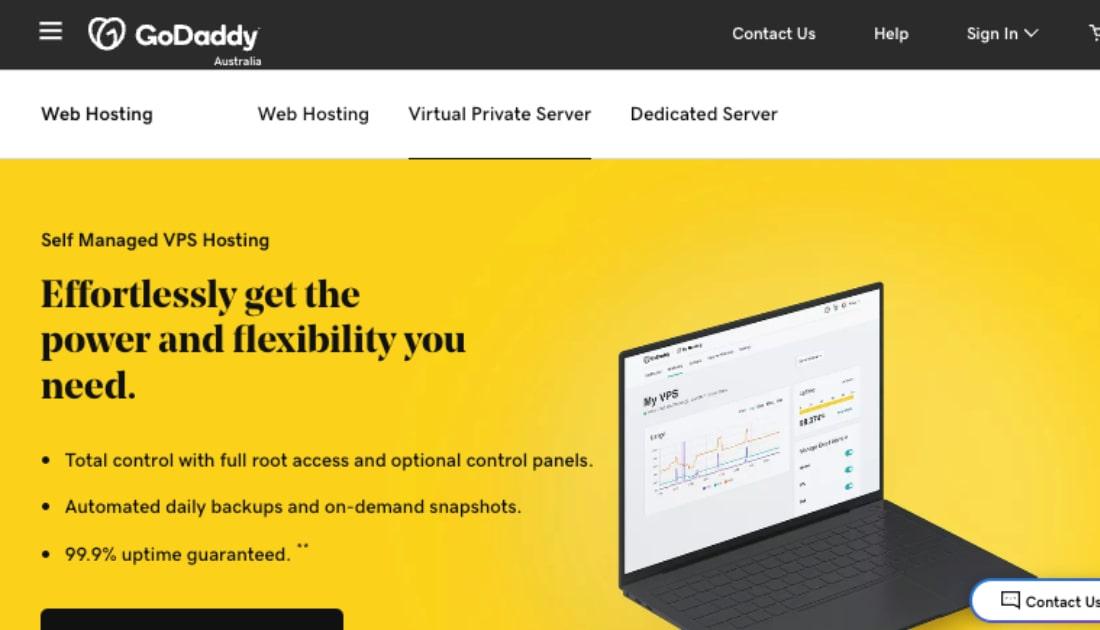Having a website that can be viewed around the world requires web hosting. Choosing a hosting service that’s both affordable and meets your needs can be one of the most important decisions you’ll ever make for your online business. This is where website hosting costs should be considered.
If you’re building a website, you likely have a budget to stick to.
You simply can't afford to pay for anything you don’t need.
It’s important to be aware of the costs of setting up your new online home before diving in.
So how much does website hosting cost?
Website hosting prices can vary, depending on:
- What your requirements are
- Your daily website traffic
- Your technical expertise
There are also savings to be gained by signing up for a year or more with a web host provider, rather than paying month by month. Below we’ll take a look at what website hosting is and what you can expect to pay.
What is website hosting?
Website hosting is essentially online storage for your website. Your website itself is made up of a bunch of files, which includes all of your webpages and multimedia content like images and video. You need somewhere online to put that data.
Without web hosting, you are the only one who could ever see your website.
It’s important to store your website files somewhere that is safe and secure, somewhere that can be quickly and reliably accessed by customers from anywhere around the world.
There are different kinds of hosting too, depending on your needs, budget and how many people you expect to draw to your website.
GoDaddy Hosting plans start at AU$6.50 a month up to $15.95 a month for a plan that handles up to 50 websites and 100 databases. All annual plans come with:
- A free domain name
- One-click WordPress installation
- 24/7 network security
- Automatic daily backups
At the time of this update, GoDaddy WordPress eCommerce hosting featuring WooCommerce started at AU$42.96 per month (check our latest prices).

Editor’s note: Website Builders such as GoDaddy’s include web hosting. If you don't plan to sell much online, you can build a basic GoDaddy website for free.
Now let’s look at each of type of hosting in more detail below.
1. Website Hosting Economy
If you’re just getting started with a blog or a small website for your business, the lowest tier of shared hosting is the least expensive choice.
Think of it as the equivalent of living in a shared house with housemates — you don’t need a lot of private space, so you can keep your website hosting costs low, and you share a lot of the communal resources.
As with all share houses, things can get tricky if one tenant tends to hog everything.
Many users share the resources of this single server, so you’ll be limited to the amount of space and resources you can use, as determined by your hosting package.
This is is not really sufficient for sites with high traffic volume, so if your business is booming or growing fast, you might want to consider a more powerful hosting plan (see GoDaddy’s Web Hosting Ultimate plan) instead.
Expect to pay: As little as AU$6.50 a month with a one-year term (see latest prices).
2. Web Hosting Deluxe
This is the next hosting tier up, with more space, power and resources at your disposal than economy shared hosting can provide. Best suited to small and medium-sized enterprises with for up to 10 websites, business hosting has double the storage of the economy plan and 15 additional databases.
It also offers Free SSL encryption for all your websites.
Expect to pay: As little as AU$8.50 a month with a one-year term (check latest prices).
3. Web Hosting Ultimate
For those who need a little more power and speed but aren’t yet ready for the expense of a Virtual Private Server, there’s Web Hosting Ultimate from GoDaddy.
This hosting option is perfect for anyone with multiple websites that:
- Have a lot of traffic, such as sophisticated e-commerce or gaming sites
- Store many videos, photos or downloads, such as wedding photographers
Web Hosting Ultimate provides:
- A big boost in speed for up to 25 websites
- 50 databases
- 75GB storage
- Free SSL encryption for all websites
Expect to pay: As little as AU$10.95 per month (check latest prices).
4. Web Hosting Maximum
This plan delivers the fastest speeds and greatest amount of storage of all GoDaddy’s shared hosting plans. It’s ideal for ecommerce stores that need fast processing power and lots of storage.
- Can handle up to 50 websites
- 100 databases
- 100 GB storage
- Free SSL encryption for all websites
Expect to pay: As little as AU$15.95 a month with a one-year term (check latest prices).
5. Virtual Private Server (VPS) hosting
Going up a level again is Virtual Private Server hosting, also known as VPS hosting.
A Virtual Private Server gives you your own exclusive space on a shared server that holds far fewer sites than standard shared hosting.
Although you do share space with others, you’re separated from them by virtual partitions.
This allows you to control more aspects of your site’s setup and maintenance.

With a VPS, you have access to guaranteed resources that you don’t have to share with other users — as well as complete online privacy and anonymity.
Expect to pay: If you manage it yourself, you can pay betweem AU$15.95 for 1 vCPU and 2GB RAM to around $80 a month for 4 vCPU and 16GB RAM with a three-year subscription (check latest prices).
GoDaddy also offers fully managed VPS for as lows as $175.95 with a three-year plan.
6. Dedicated hosting
Designed for larger businesses and organisations, this is the ultimate in powerful, flexible website hosting.
Dedicated server hosting means you are the only tenant on your very own server.
This gives you absolute freedom and total control over the setup and configuration of your own network, so you can tailor it to fit the specific needs of your business.
Unlike a shared server that powers multiple sites, a dedicated server powers just one and can withstand high traffic volumes.
This all comes at a much higher price, however, and with greater freedom and power comes greater responsibility. If something goes wrong and the server goes down, it’s on you or your team to fix it.
Expect to pay: Dedicated hosting costs anywhere from AU$249.95 per month and $740.25 per month (check latest prices).
Additional costs
Aside from website hosting costs, there are a few other costs to be aware of that may come up in the process of building your new online home. It's important to understand them all upfront — before you sign up for anything — so you know exactly what you will and won't get for your money.
SSL Certificates
SSL Certificates authenticate the identity of a website and encrypt information sent from the website to the server, such as a user’s name and bank details. They’re an essential component of website hosting, especially if you intend to sell products and services online.
Renewing your SSL Certificate can cost between AU$0 (if you DIY) and $159.95 each year.
However, some hosting companies include a free SSL Certificate in their hosting packages, so it pays to shop around for the best deal.
For example, if you choose to use GoDaddy’s Website Builder for your site, an SSL is included for free. The same is true for all three of GoDaddy's WordPress Hosting plans.
Firewalls and security
A firewall is a security system designed to prevent unauthorised access and malicious activity on your device or private network. If you’re considering dedicated hosting, this becomes your responsibility and an added cost and consideration.
Hiring a web developer or designer
If you need some professional help along the way with your website or with setting up eCommerce, you might encounter additional costs here as well in hiring a web developer or designer.
Depending on who you choose, these costs can pay for themselves in increased traffic and reduced time spent tinkering with your website.

Alternatively, you can also scope the internet free online resources that'll save you on design costs and are simple to use.
GoDaddy’s free logo maker is a great example of an online tool anyone can use to create custom graphics for ads, social media posts and more — no prior design knowledge is necessary.
Avoiding some common web hosting pitfalls
A quick Google search will show thousands of results for website hosting, all offering different plans and options. It’s worth noting that they are not all the same which means there are some things you need to look out for.
Below are three common pitfalls.
1. Is it really free?
Some companies offer "free" website hosting, but there is usually a catch and may lead to disappointment — or worse, loss of sales and visitors to your website.
And you may have limited or no control over who gets to advertise on your website.
Free hosting could also come with restricted bandwidth and data allowance.
Double check the web hosting terms and inclusions before selecting the right provider for your business. When it comes to website hosting, you get what you pay for.
2. Will help be there if your website goes down?
It’s usually all well and good at the start until you run into some problems, which is why it’s essential to check what type and how much support the web hosting company provides.
- Some companies offer 24 x 7 x 365 days of online help to resolve any of your queries in the form of a chat.
- Some offer support via a phone call.
- The ones that provide the least support usually ask you to fill out a contact form (open a ticket) – which can take a lot longer to respond to.
This can be a problem because every minute your website is offline costs you in lost sales.
3. Is the website host safe and secure?
For customers to have trust and confidence in your business, your website needs to be secure, and it starts with having the right website host.
Some web hosting companies don’t offer protection for your data from getting hacked or compromised.
Your web hosting company should give you and your customers the confidence that it is safe to browse and transact.
So, before selecting a web hosting company, you need to ensure whether or not it gives you the required level of security that you need for your website. It is only after being satisfied with the security terms that you should opt for a web hosting company.
Web hosting costs wrap up
Website hosting costs can vary according to what you need. Be it shared, business or dedicated hosting, or your own virtual private server, set your business on course for online success with the right website hosting that suits your needs and meets your budget.
You can always upgrade your hosting as you go if you find the scope and size of your business changing.
Finding the most affordable solution tailored for your needs right now will get you online faster. From there, the sky’s the limit to how far your business can go.
Adam Turner and Cathy Ngo contributed to this post.
Frequently Asked Questions
Here are answers to a few common questions about website hosting.
Is cheap website hosting worth it?
Cheap or “free” website hosting — what could go wrong? Lots!
It is tempting to go for cheap web hosting and rationalise it by thinking you’ll upgrade to a paid plan later once your business grows. It seems like a logical decision at first; however, saving a few dollars a month can cost you.
Downtime or server outage can be a nightmare, especially if your website is attracting hundreds of viewers a day. With cheap web hosting, you don’t know when your site will be back up and running again, as there are few guarantees, and support may be limited.
Cheap web hosting service providers can be unreliable because they are usually selling space on shared hosting platforms. This means resources like CPU, memory, and disk space are shared with others. So sudden traffic surges to other sites on your server may slow your website’s load times, running you into the risk of losing customers, sales and website ranking.
What does GoDaddy website hosting offer that others don’t?
Other than a very competitive price, 99.9% uptime rates, loads of web storage (starts at 25 GB) and a free domain.
GoDaddy’s customer service team are all over the world, with dedicated support for Australia. It means you’ll get support in the Australian time zone 24/7/365, giving you peace of mind if you experience any hiccups.
GoDaddy keeps it simple and secure, no matter the size of your business with one-click installation options and an easy-to-use control panel.
What is the difference between domain hosting, email hosting and web hosting?
While they’re all interrelated, your domain, email and website are three separate things.
A domain host manages your domain name, such as BusinessName.com. Domain hosts use Domain Name System (DNS) records to securely connect your domain name with your email and website.
Email hosting, on the other hand, is where your email inbox is stored. It can be on the same server as your website or managed by another host.
Web hosting is a service that allows your website to be visible and accessible on the internet and web browsers. Your web content is hosted on a server.
To make things easier and cost-effective for businesses, many providers offer domain, email and web hosting all bundled up in a package.
When you sign up with GoDaddy web hosting, you get a free domain name, one year of SSL encryption and the free use of two Microsoft 365 mailboxes for a year.
Do I need anything more than basic hosting if I’m not selling things on my website?
This depends on the type of business you have. For more straightforward informational websites with minimal plugins and graphics, an Economy plan would usually suffice.
If, however, you are a photographer and plan on uploading lots of photos to your website or you run a popular gaming site, for example, you'll likely need more than basic hosting.
Something like GoDaddy’s Web Hosting Ultimate would be able to better accommodate the ample storage space and faster load times needed for such sites.
What is the average cost of a website?
It's very affordable to get your website up and running, but the exact cost depends on the purpose of your website and how many visitors you expect.
Think of it like buying a car, there are plenty of great options, but no single car is the perfect option for everyone. Some cars are certainly very economical, but the right car for you depends on why you need it.
You'll find more details on site building costs in this post.
The cost of a website is broken into two main components:
- The initial cost to build the website
- The ongoing cost to run the website — just like the purchase cost of a car and the running costs to keep it on the road
GoDaddy Website Builder lets you build your website for free. If you’re satisfied with what your website can do, it continues to be free (including hosting).
If you need more power, you’ll pay between AU$13.95 and $24.95 per month,* with databases, storage and other features increasing as you go up. Bandwidth is unmetered on all plans.
You can set up a small-to-medium eCommerce site with GoDaddy Online Store for free, and only pay when you're ready to start taking orders. Then just upgrade from your free plan to the Ecommerce plan ($26.95 per month) to open your online store for global business.
The cost of your website naturally increases if you need the services of a web designer. Costs for designing a brochure site start at around $3000, with a small-to-medium eCommerce site starts at around $6000.
On top of this you'll need to pay separately for hosting (from $7.95 per month) and a domain name (learn about domain costs here).
You can learn more about what it costs to build a website in Australia here.
What is the cheapest way to host a website?
You will find a range of free website hosting services but remember, you get what you pay for. Plus they tend to offer very little in the way of features, performance, reliability and customer support.
Free hosting plans often insert advertisements into your website. Considering these issues, free website hosting may not be suitable for all businesses.
The cheapest dependable way to host a website is to sign up for a shared hosting plan, preferably one that includes a free domain name and SSL certificate as part of the deal.
Shared hosting means that you're sharing a single server with other websites. This helps keep down the price, but it may not suit if you have a website that stores many large files or you expect especially high traffic.
If that's the case, you might be better off with a virtual private server (VPS) or dedicated hosting where you don't need to share the server with other websites. You can find details on both above.
What are the benefits of hosting your website on a cloud?
Traditional website hosting involves running your website on a single physical server, either sharing that server with other websites or having the server all to yourself.
If your website experiences greater demand than what your server can deliver, then you need to upgrade your plan to allocate more resources.
Cloud hosting is hosting your website across multiple virtual servers running in the cloud. They can even be spread across different regions to improve performance for visitors coming from different countries.
Because it is running on virtual servers rather than one physical server, cloud hosting makes it very easy to increase or decrease resources on the fly. This can be an attractive option if your website is likely to experience occasional large spikes in traffic, rather than have a relatively steady flow of visitors.
The trade-off is that cloud hosting can work out to be more expensive than hosting on a single server.








